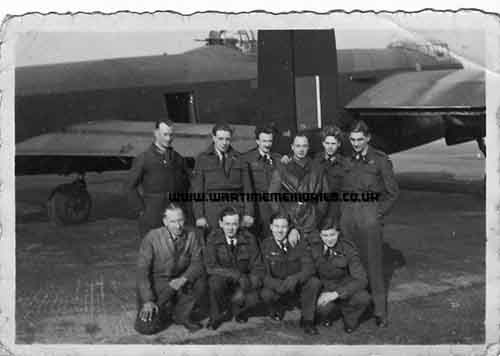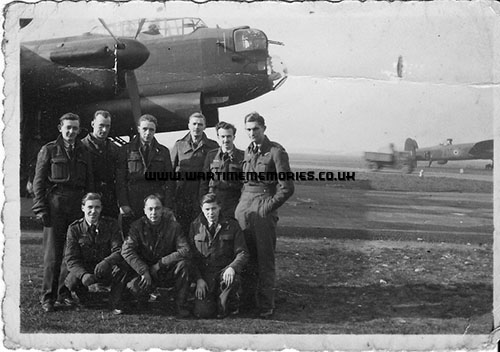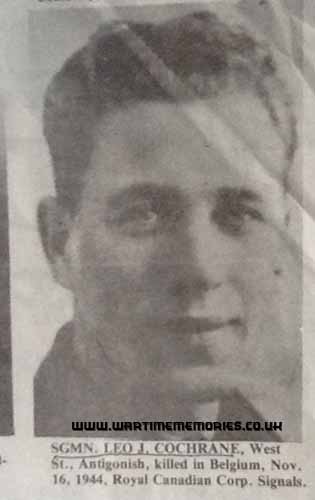Pte. Ernest Edward Cochrane MID.. British Army No.18 Company Royal Army Medical Corps from East Ham, E.London Ernie was born in East Ham in the East End of London on 18th April 1917. At the outbreak of war in 1939 he was a conscientious objector. Nonetheless, on June 6th 1940 he was deemed to have enlisted in the Territorial Army Non-Combatant Corp and posted to A.M.P Corps. No.2 Centre, Caister. During the 1930s Ernie had gained a St John's Ambulance first aid qualification so he was discharged from the T.A. to join the Royal Army Medical Corps. Aged 23, he took the oath of Allegiance at Girton College Cambridge and was posted to R.A.M.C. No.18 Company. He was graded and mustered and posted to No.1 Depot and Training Establishment R.A.M.C. Crookham (Crookham Camp, Aldershot) with the rank of Private and service trade, Nursing Officer Class II. The date was September 4th 1940.
Ernie said the R.A.M.C. was otherwise known as "Run Away Matron's Coming". After receiving training, his company embarked on a convoy ship departing from Glasgow on Dec 12th 1940 for Malta. No sooner had the ship left the Clyde than its engine started producing plumes of black smoke. Being unable to keep up the convoy it was left behind and forced to continue alone, pouring smoke, a sitting duck to any U-boat. Luckily, they did make it to Gibraltar. After repairs there, the ship set sail for Malta but was forced to divert to Pireas in Greece first because of German bombing. Malta was under siege by the Germans 1940-1942.
Eventually, on January 14th 1941, Ernie disembarked in Malta and remained there throughout the siege. Two days later on 16th January HMS Illustrious was bombed in Grand Harbour. Life on Malta was not easy. Ernie thought the troops probably faired better than the locals as at least they had some army rations. When he arrived, he said, there were lots of cats and dogs on the island but by the time he left there were only their fleas. His cousin Doreen, a young evacuee back in England, was chastised by Ernie after she wrote to him about all the nice things she’d had to eat at Christmas. At one time on Malta, Ernie was in a cinema which was bombed. He was eventually dug out of the rubble without, he claimed, a scratch on him. Whether this event accounts for his stay in the General Hospital Imtarfa between May 5th and June 13th 1941, we do not know.
On Sept 4th 1941 Ernie was advanced to Nursing Officer Group 'C' Class I, although it wasn’t until March 1943, after the siege of Malta had effectively ended, that he undertook the required course of instruction at 45 Gen Hasp. Recognition of his status as Nursing Officer Class I was not noted in his service record until April 14th 1943.
On Aug 26th 1943 Ernie left Malta. He was taken by ship to N. Africa for a new posting with the Mediterranean Expeditionary Force. En route many suffered from stomach upsets which were officially put down to seasickness but Ernie put down to bad bully beef. They landed in N. Africa (Alexandria, Egypt) and from here they were taken to Haifa by railway.
Ernie’s service record states that on Sep 20th 1943 he was “Moved for unknown destination” and three days later “Disembarked in Cos”. Cos had been held by the Italians until September 1943 when an unconditional armistice with the Allies was announced. Ernie and a couple of fellow medics were sent to Cos to assist the British fighting troops there at an inland medical unit.
On Oct 3rd 1943 at 4.30am Germans invaded Cos with Ju 87 dive bombers, Brandenburg Division paratroopers and sea-bourne troops. From the medical unit they could see the German's parachuting into the hills in and around Antimachia. They could hear the bombing and shooting but their commander said there was nothing to do but wait. The following morning the Germans arrived at the medical station and commanded the allied troops to collect their belongings and line up outside. Not wishing to be a POW Ernie escaped via his hut's back window and headed for the sea. When an uproar ensued behind he dived into an irrigation ditch to hide and await darkness before moving off. After the war Ernie learnt that his mate, nicknamed Tiny, was taken prisoner that day and spent the rest of the war in a German stalag.
That night Ernie hid under a bridge to sleep. Early morning the next day he was alarmed to find there was a German Officer shaving outside a nearby hut. Ernie was forced to wait until the coast was clear before emerging. He made his way to the sea and searched in vain along the coast for a boat. Whilst sitting in the sand dunes eating his emergency rations he heard a German soldier shout "Achtung". He hurriedly slithered into sea on his belly. In panic he swam under water for as long as possible to avoid detection thus beginning a ten miles swim to the Turkish mainland. At this time Turkey remained neutral in the war. Ernie had been a champion swimmer in his East Ham swimming club so was not daunted. His swim was guided by the lights of a fishing port on the Turkish coast. He found an oil drum in the sea to aid his buoyancy. He was picked up near the Turkish coast by a Turkish fishing boat. At the local port he found many other escapees who had arrived by boat but no-one else who had swum. When my father told me this story in the 1990s his narrative was in the singular. However, one of my brothers says Ernie was not alone on his escape endeavor but our father had told him that none of his other compatriots actually survived the swim. Ernie was unsure what had happened to them.
From Turkey the escapees traveled in a landing craft to Castel-Rosso (now called Kastelorizo), a Greek island further east, 2 miles off the Turkish coast and still held by the British. From here Ernie was evacuated to Beirut. The 18th Company R.A.M.C. were still based in Haifa, Palestine. However, in Beirut Ernie is not immediately sent to re-join his unit in Haifa but held in solitary confinement and asked to write what has happened and how he got here. He doesn't find out, until arriving back in Palestine on 14th October, that his comrades have been asked to read his account and verify he is who he claims to be. He thinks the military may have thought him a potential spy.
Two weeks later, on Oct 31st 1943, Ernie is moved once again from “Palestine to unknown destination”. On Nov 3rd 1943 he disembarked on Leros. He is here nearly 2 weeks before the Germans come. During this time an officer insist they paint a big red cross on the roof of their forward medical station so it wouldn't be bombed. Vain hope! On Nov 12th 1943 at 4.30am the Germans landed on Leros and heavy fighting ensued. Ernie was Mentioned in Dispatches for distinguished service. This was published in the London Gazette 23rd March 1944. He thinks this may have been for single handedly rescuing a badly injured soldier when their forward medical station was bombed. His senior officer had gone in search of transport and never returned.
In the morning of the 16th the British surrendered. Back in the UK Ernie was reported “Missing (Aegean)” and “Posted to X(VI) DCL 748/43”. However, Ernie along with the injured allied troops were loaded aboard a hospital ship as POWs and set sail for Northern Italy - ultimate destination a stalag. The details of what happened next are unclear. There are two, not necessarily conflicting versions. En route they came across a British held ship full of injured German prisoners of war. The two commanders agreed to swap prisoners. Alternatively, en route they encountered the Royal Navy which forced the hospital ship into Brindisi. Either way Ernie landed in Allied held Brindisi, Southern Italy on December 12th 1943. Back home his record entry states “Previously reported missing now located having been recaptured. Removed from X(VI) DCL 755/43”. On December 18th he is “posted to X(IV)C”. On 24th December he joins the British North Africa Force and posted to X(i) which was a list of escaped POWs awaiting repatriation to the UK. From Brindisi in Italy he sailed to N.Africa and his photographs show a transport train in the Atlas mountains between Tunis and Algiers in Dec 1943 and a large group of British soldiers in uniform at Fort de l'Eau Algeria (a suburb of Algiers) in Jan 1944.
Ernie lands back in England at the port of Liverpool and by the end of January he is back in London. His service record on the 8th February declares that he is “Disembarked UK from overseas”; “Posted to 'Y' List Class 'D' (Escaped POWs)” and given some leave.
On March 23rd 1944 Ernie learned he has be awarded the Emblem for being Mentioned in Dispatches in recognition of gallant & distinguished services in the field.
On 7th April 1944 he was required back at work with the R.A.M.C. 18th Company stationed in Millbank Barracks, London SW1. Ernie was set to work in the Queen Alexandra Military Hospital (QEMH) Millbank. These buildings later became Chelsea College of Art & Design and part of Tate Britain next door. Ernie claimed that the only thing of note he did from then to the end of war was to give King Hussein of Jordan TTC injections. It could have been different as, at some stage, there was the toss of a coin to decide which of two Medical Officers is to serve in the D Day landings (June 6th 1944). Ernie stayed in London!
In Ernie’s medical report in April 1946, prior to his release, the countries in which he served are listed as: Malta 2yrs 9 months; Dodecanese & Palestine (together) 4 months; Italy and Algeria (together) 2 months; U.K. 2 years. Ernie proceeded on terminal leave on May 9th 1946 and went on to a highly successful career in Local Government Public Cleansing.
After a whirlwind romance Ernie proposed to Wren Olive Winifred Bailes. They met at a YWCA dance in London and married at St George & St Ethelbert Parish Church East Ham, London E6 on July 26th 1944. There were no photographs of this wartime wedding as there was no photographic paper available at the time. They were married for over 50 years and had 4 children.
It was not until he was in his eighties and nineties that my father talked about his wartime service and then only very seldom, when pressed. We do know he suffered from bad nightmares associated with his wartime experiences and particularly his cinema bombing experience on Malta and his underwater escape from Cos. His sister, my Auntie Edie, said that during the war people were continually warned that “Talk Costs Lives” so became used to not to talking about their work and after the war everyone just wanted to forget and get on with their lives. The story here is derived from the bits my father told us, memories from his sister and cousin, and his wartime photographs, all pieced together with the aid of his wartime service record and the internet. We acquired his service record from the Historical Disclosures Section of the Army Personnel Centre in Glasgow, after my father’s death in January 2010 aged 92.
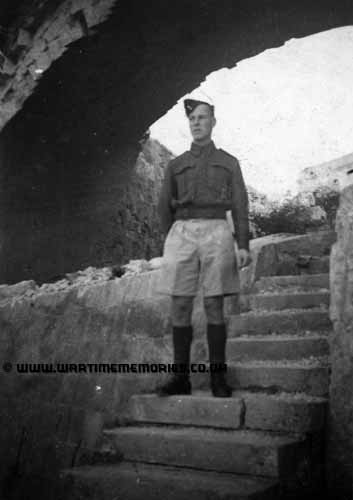
Ernest Cochrane, Floriana, Malta 1942
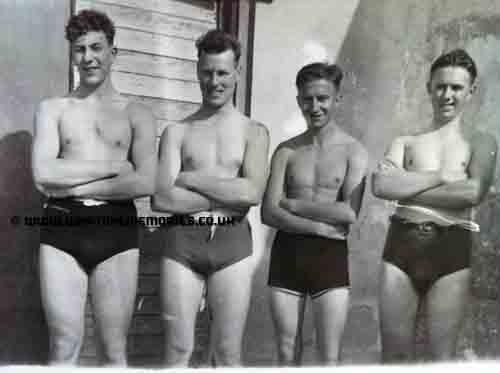
Malta 1941 From left to right: ?? : Ernest Cochrane : G. Goodie : Owen Green
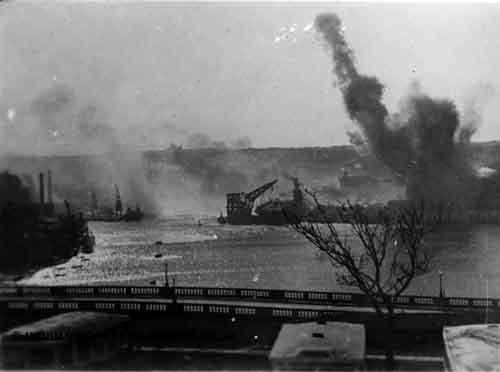
The bombing of HMS Illustrious, Grand Harbour, Malta January 16th 1941
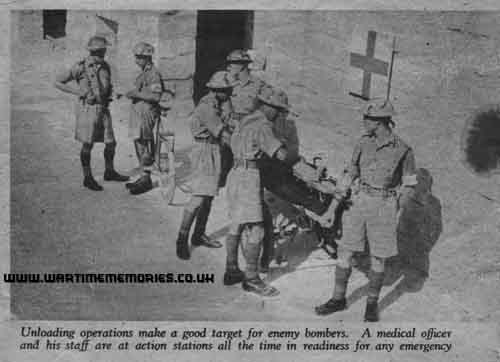
Ernest Cochrane on the right. From Illustrated August 29th 1942
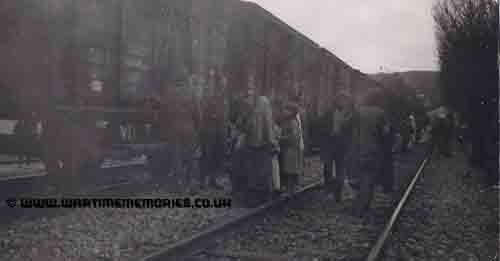
Transportation train in the Atlas Mountains between Tunis & Algiers December 1943
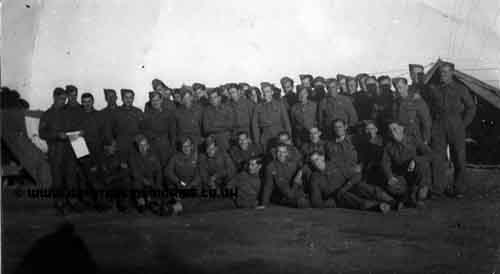
Fort de l'Eau Algeria January 1944
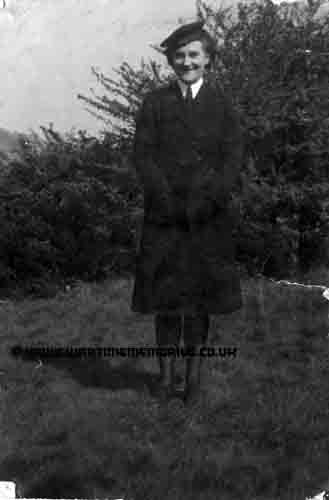
Olive Winifred Bailes (W.R.N.S. No 46361)
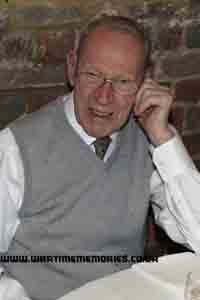
Ernest Cochrane aged 92 (Dec.2009)
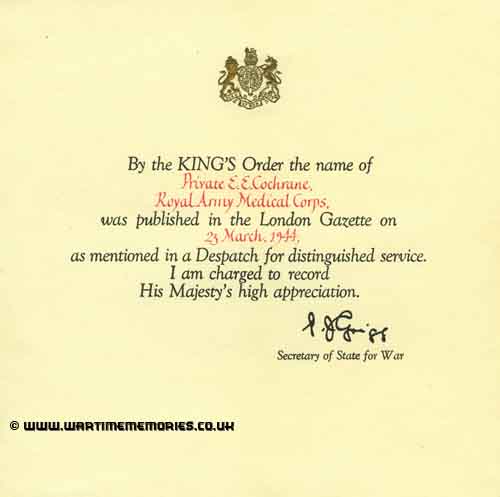
Citation Certificate
| 

